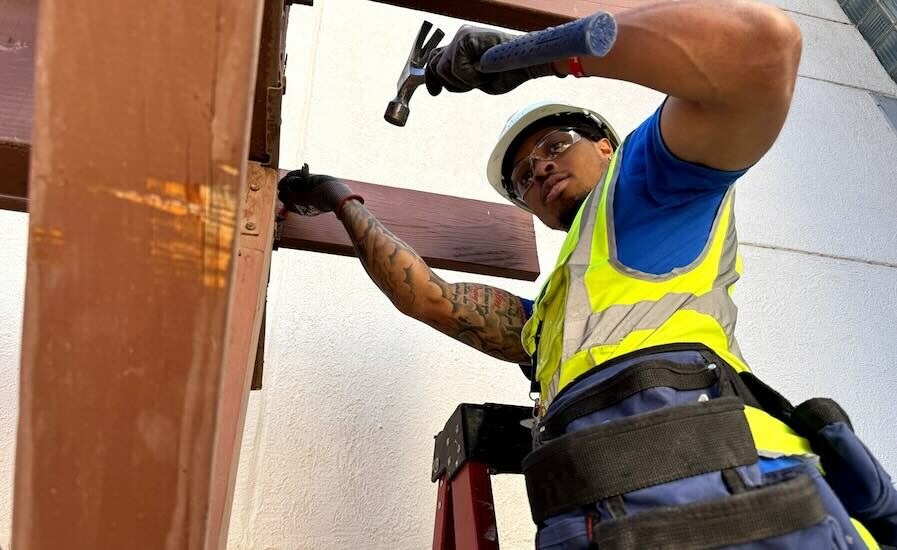
Federal Judge Provides Lifeline for National Vocational Training Program
[ad_1]
A federal judge ordered the Trump administration to keep Job Corps—the nation’s largest residential job training program for low-income youth—operating until a lawsuit fighting efforts to shutter the program is resolved.
“Once Congress has passed legislation stating that a program like the Job Corps must exist, and set aside funding for that program, the [U.S. Dept. of Labor] is not free to do as it pleases; it is required to enforce the law as intended by Congress,” wrote U.S. District Judge Andrew Carter in his June 24 ruling. The new order extends a temporary order issued earlier this month.
The lawsuit was filed by the National Jobs Corps Association, which represents Job Corps operators.
In March the U.S. Dept. of Labor ended the legally required background checks for new Job Corps applicants, and on May 29 notified the 99 privately-operated Job Corps centers nationwide to shut down their campuses by June 30. In addition to the 99 centers offering educational and vocational training, a further 24 centers are operated by the U.S. Forest Service. All 123 centers are contracted through the DOL, serving more than 20,000 students nationwide.
The court order provides “a lifeline for the tens of thousands of youngsters whose futures depend on the training, support and opportunities that Job Corps provides,” the National Jobs Corps Association said in a statement. “The federal court’s decision returns some stability to these students, as well as for the staff and their communities. Students suddenly displaced by the closure announcement, can return to Job Corps campuses from shelters or other temporary or unstable housing.”
The judge’s order also will aid the thousands of employers nationwide who depend on the program to supply skilled workers, the association notes.
Since its inception in 1964, Job Corps has helped thousands of low-income youths further their education and job training in the hope of gaining employment. Its trainees include many who resided in homeless shelters or in foster care, or have suffered physical, sexual or emotional abuse.
“Each year 3.5 million young people in America experience homelessness, one of the most challenging barriers to overcome in securing gainful employment,” the association said in its statement. “Yet, rigorous studies have shown that Job Corps increases participants’ employment rates and earnings and decreases their future reliance on public assistance. That’s why members of Congress, both Republicans and Democrats, funded Job Corps through June 30, 2026.”
In it’s own response to the court order, the DOL said that “the [May 29] decision follows an internal review of the program’s outcome and structure and will be carried out in accordance with available funding, the statutory framework established under the Workforce Innovation and Opportunity Act, and congressional notification requirements.”
Labor Secretary Lori Chavez-DeRemer added that while the program was created to help youth improve their lives, the DOL found “a startling number of serious incident reports and our in-depth fiscal analysis reveal the program is no longer achieving the intended outcomes that students deserve.”
DOL is working closely with the Dept. of Justice to evaluate the injunction, Aaron Britt, a DOL spokesperson told the Associated Press. “We remain confident that our actions are consistent with the law.”

Harris
Uriah Harris, 20, a second-year Black apprentice for the International Brotherhood of Electrical Workers (IBEW) Local 340, says Job Corps training enabled him to complete high school while training for a job in the trades after dropping out in his senior year.
“Many of those kids are studying and feeling a sense of direction like I do,” Harris says. “Closing that down is just not right.”
After the Covid-19 pandemic moved classes to Zoom during his sophomore year, the Stockton, Calif.-native struggled academically and “didn’t have much direction and wasn’t thinking about a career.”
His dad suggested he consider Job Corps, which trained three older family members. Of the eight trades offered by Job Corps, Harris initially chose heavy equipment operations for construction but ended up opting for building construction technology, including carpentry, electrical and HVAC, with specialization in electrical work. For 11 months, Harris lived on the Sacramento campus with three roommates, 60 miles from home. He made up his junior and senior years of high school to earn his diploma while learning trade skills. Once completing the program, he received a $1,500 stipend.
“It gave me something to work toward,” he says, “something good to get up for in the morning and it was good to know it would lead to a positive future.”
[ad_2]
Source link
Post a Comment
You must be logged in to post a comment.






